Blueprints: "Sunset Boulevard"
 Thursday, December 28, 2017 at 12:34PM
Thursday, December 28, 2017 at 12:34PM Happy almost New Year, everyone! In these times of personal transformation, Jorge dives into one of the greatest screenplays ever written.
The all time classic Sunset Boulevard contains a multitude of scenes, and moments, and quotables to pick from and analyze in the page. But since we're close to a new year, let’s take a look at precisely that time in the film, when Joe Gillis decides to finally let go of his old baggage and step fresh into new things. Even if that old baggage is a possessive fading movie starlet...
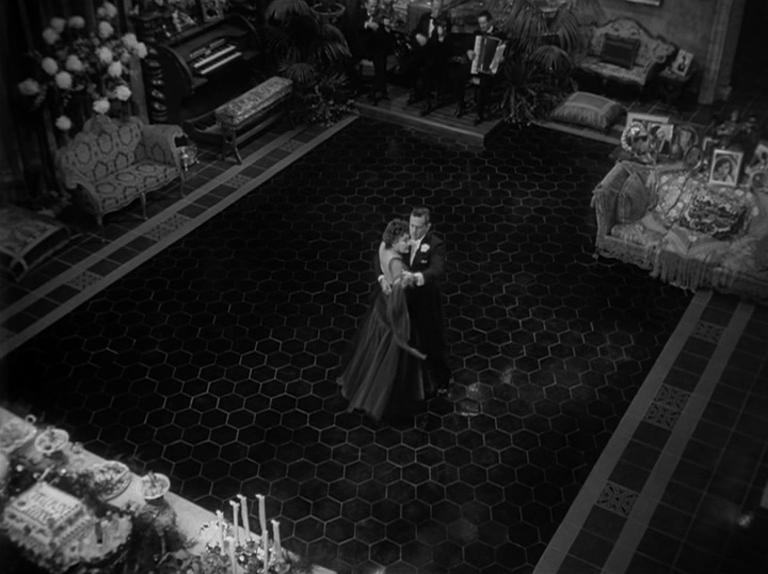
Sunset Boulevard
Written by: Charles Brackett & Billy Wilder & D.M. Marshman, Jr.
[You can read the full script here. I will be talking about these pages and this scene.]
Throughout Sunset Boulevard, Joe Gillis has slowly entangled himself in the webs of seduction, deception, and shiny clothes of Norma Desmond. He enjoys the perks that come with giving her the attention that she desperately craves. But they also come with a price, which he starts to realize as she starts to gradually and quietly take over every aspect of his life.
By the time the New Year arrives, Gillis feels more trapped than ever in her world, with little opportunity to escape. The script perfectly describes his sense of entrapment.
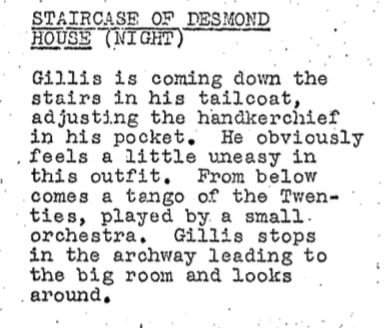
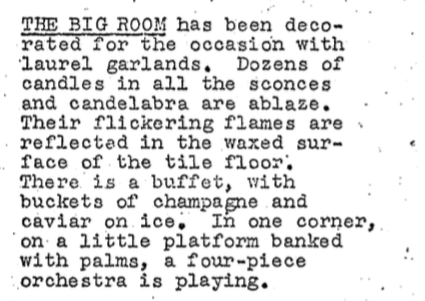
“He obviously feels a little uneasy in this outfit.” His clothing (and per association, his body) has been taken over by what Norma wants him to be. As he descends the staircase into what Gillis thinks will be a party with other guests, the opulence of the house (and of its owner) screams back at him: “laurel garlands,” “dozens of candles in all the sconces,” “buckets of champagne and caviar”.
The first interaction she has with him is putting a gardenia on his lapel, and then commenting on his outfit; an outfit that she chose for him, and that it’s still not good enough for her (“I don’t like those studs they’ve sent”). She will have him to his liking.
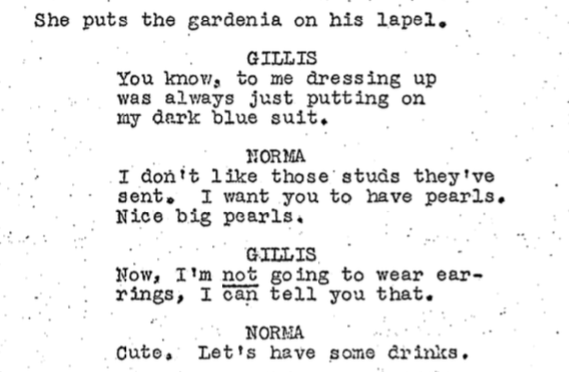
Then they dance together in the big room. The floors are slippery; she had them waxed. Although the suffocation and discomfort of these particular two people dancing together while a full orchestra plays and a servant watches from afar is clear in the pages, it’s in the film where this particular moment really rises. The shot frames them almost as an island in the middle of the ocean, where nowhere to go.
But then she reveals: “There are no other guests. […] This is for you and me”. And he declares her love.
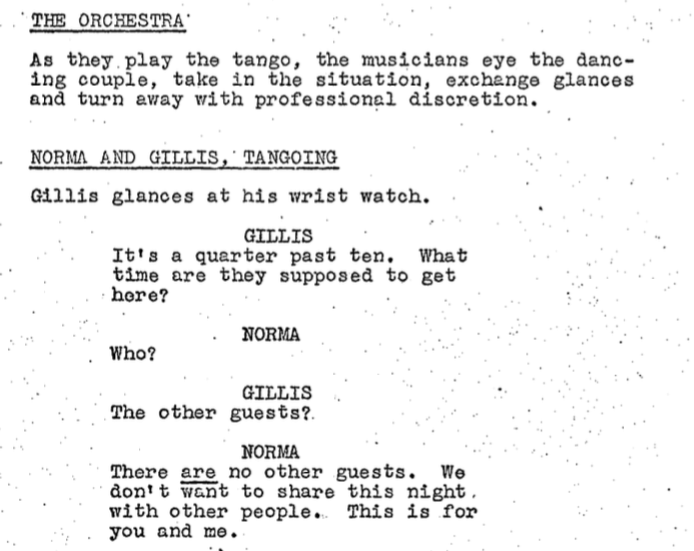
They continue their dance, but Gillis is not enjoying it anymore. Norma lights up a cigarette, an object that the writers (there was three of them for the script, one of them director Billy Wilder himself) quite ingeniously use as a metaphor for his captivity: “I felt trapped, like the cigarette in the prongs of that contraption on her finger.”
It’s flee-or-stay-forever moment for Gillis. An argument ensues, in which he tries to get her to stop buying things for him, to stop taking him places, that he also has a life of his own. The idea that he might be able to carry on without her is too much for her, and she strikes him. Then she leaves, offended and emotional.
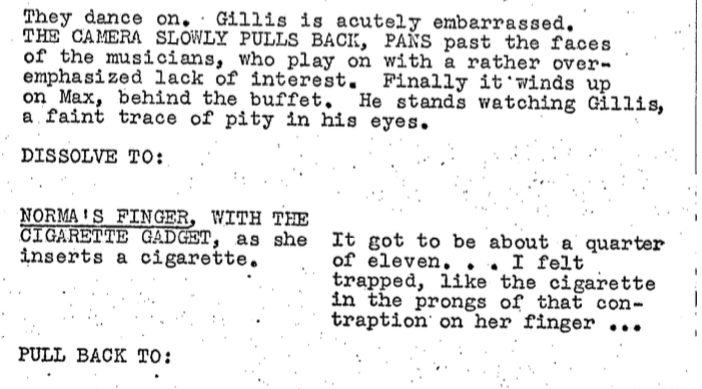
This is the moment that changes everything, when her control and yearning for anyone to love her again took a physical form and stroke him in the face. Gillis goes to another party, and when he returns to the mansion, he is determined to leave forever. However, he finds that Norma has slashed her wrists and returns to her lap again.
New Year’s Eve was a chance for Joe Gillis to get rid of the things that tied him down, that stopped him from moving forward, and that controlled his life without his consent. Sure, those things all a woman with a detached sense of reality, but we all have our own Norma Desmonds. Take this new year as an opportunity to leave her behind, and to not look back, like Gillis fatally did.
Happy 2018 and watch out for the pool!



Reader Comments (12)
I absolutely loved this movie. They just don't make this kind anymore iMO
A true masterpiece of Hollywood's classic studio era.
Very well-deserved Academy Award of "Writing, Story and Screenplay" for a movie where the protagonist and narrator is a screenplay writer. Won also the Score - Franz Waxman - and Art Direction-Set Decoration(Black and White) - Hans Dreier, John Meehan, Sam Comer, Ray Moyer.
Is a kind of father/mother of What Ever Happened to Baby Jane?(1962). One of the most quotable movies of all times. Clashed with another quotable sour classic, All About Eve.
Gloria Swanson was robbed.
Billy Wilder makes use of tango in Some Like It Hot again, nine years later, this time in a funny situation, maybe the funniest moment of that movie full of funny moments. One of the peculiarities of his movies is that he hardly puts an end in the stories - there's always or almost always the sensation of unfinished - intentionally - and you ask what's gonna happen with the character(s). Some Like It Hot(1959), Irma La Dolce(1963), The Major And The Minor(1942), Witness For The Prosecution(1957)... After the iconic "end" of Sunset Boulevard you ask what's gonna happen with Norma Desmond.
Craver-
Yes indeed! What are the odds of having the 2 of the most iconic female leading performances EVER in the same year? oh to be alive in 1950 and see a double feature of All About Eve and Sunset Boulevard at the matinee!
Best movie about movies followed by The Bad and The Beautiful and Singin' in the Rain.
I agree with Gwen- it still the definite look at the dark side of Hollywood and what happens when to once great stars when the cameras stop rolling
jaragon -
And he did it when he was "the Golden Boy of Hollywood", praised and awarded. Some of his colleagues thought the movie was "a stab in the back" of the industry that "made him famous and rich". At that moment in his career Billy Wilder had enough prestige with audience and critics that the studio (Paramount) let him to do what he wanted and didn't know much about the movie. Part of the industry, of course, loved the movie because what it shows is true. As you said, a side of the story that not everybody wanted to be exposed. Anyway, is much easier criticize when you are an outsider than an insider like he was.
Gwen
The great Billy Wilder was not afraid to look at the dark side of life "The Lost Weekend" (1945), "Ace in the Hole" (1951) even his lighter films like " The Apartment" (1960) have a dark edge. Interesting that in the end of his career Wilder became like Norma Desmond- a man who the industry thought his time had passed but his best films are true cinema classics
jaragon -
Exactly. His work is more remembered and studied every day, like of other contemporaries like William Wyler, Howard Hawks, George Cukor, John Ford, Alfred Hitchcock, Fritz Lang... His generation created the base of the universal filmography. They and their works will be eternally discussed; they are for the movies what Beethoven & co. are for the music, Shakespeare & co. are for the theater and Charles Dickens & co. are for the literature. They are forever.
Billy Wilder is the director who knows how to begin and give an end to a film. And which movies are at the same time a guide and a curse to those filmmakers that came in the future.